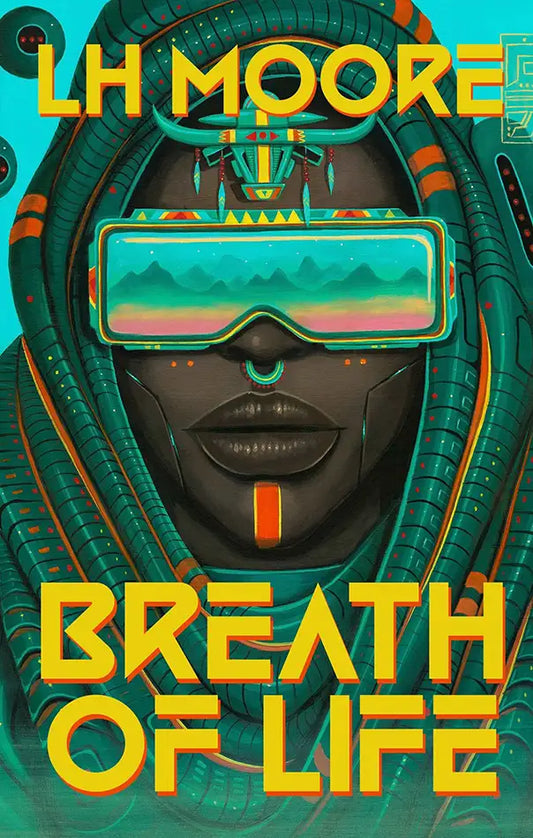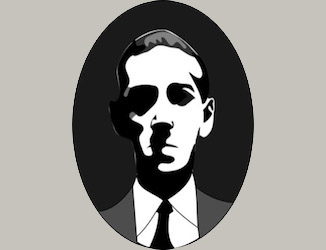
A major component of cosmic horror in general, and of Lovecraft’s work in particular, is the element of the occult. In many ways, Lovecraft’s occult aspects are true to the origins of the word: much of what various characters in his stories seek is that which remains hidden or concealed from view. By uncovering and practicing secret rituals and speaking ancient words, these characters reveal powerful knowledge and cosmic truths, both awesome and terrifying in their implications and scope. For decades, scholars have explored Lovecraft’s real-life connections to the occult, based on his fiction, his correspondence, and his personal life, in order to unravel whether he had some truly esoteric link to realms beyond ours, or was simply an imaginative dreamer from Providence. He may very well have been a little of both.
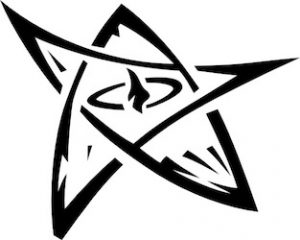
Lovecraft’s correspondence with others in his circle of friends suggests that, while he was well-read on the subject, he was not a personal practitioner of magick.6 Much of his knowledge of the occult seems to have come from books on European witchcraft, written by people outside those witch-groups and colored by the perceptions of non-Christian religions during his time, as well as colonial American witchcraft, as described by witch hunters of Salem like Cotton Mather.6 Some of these latter sources contain alleged accounts from accused witches, although the credibility and interpretation of such accounts would necessarily be, at best, somewhat questionable. A movement toward freer expression of religion in the 1970s has given us some insight, however, into magickal systems. We have come to see that while some of the details of actual occult practice, both modern and traditional, are often misrepresented in Lovecraft’s work, there is much that Lovecraft incorporates that is, surprisingly, close enough to give actual practitioners pause. An examination of the specific words used by Lovecraft suggests that he was not intimately aware of actual occult practices for raising demons or demonic gods, since his language in the rituals more closely resembles protective spells, which include the invocation of various names of the Judao-Christian God (or slightly altered versions of those names), such as Hel, Heloym, Emmanvel, Tetragrammaton, and Iehova, as well as names of archangels, such as Sother and Saboth, referenced in “The Horror at Red Hook.” 2,6 These names are generally used in protective sigils by practitioners of magick against entities summoned against their will for service or information. Such usage would seem counterproductive in the raising of those entities themselves. Further, in “The Case of Charles Dexter Ward,” his titular character references elementals (sylphs, gnomes, and salamanders) in one of his invocations, which is suggestive of pagan worship rather than anything satantic.5,6 However, many aspects of the rituals, such as the drawing of protective circles, the directions in which said circles lie, the placement of candles, and certain substances used, are more or less accurately portrayed. Furthermore, Lovecraft’s incorporation of geometry into magick (such as in “Dreams in the Witch House”)4 is a notion that has been historically present in magick systems for ages.
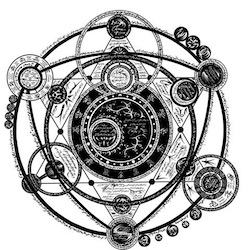
A superficial examination of the goals of modern occult groups in the US and Europe today shows interesting comparisons and contrasts to both the slavering cultists of Lovecraft’s work and his occult scholars. Actual modern occult groups, from The Hermetic Order of the Golden Dawn (founded by Aleister Crowley) and the Ordo Templis Orientis to the Church of Satan (founded by Anton Szandor LaVey), pursue a system of beliefs that, rather than seeking to better one’s mind and soul and reach a purer, more perfect spiritual form, embraces a physical or carnal connection to the earth, and approaches the spiritual world as a means to access power and knowledge. Regardless of the spiritual focus, there is a consistent element of intellectual study and of self-attainment through practical application of concepts, as mathematical and scientific as they are spiritual or physical. Conversely, Lovecraft’s cultists are often depicted as mindlessly subservient, nearly animalistic savages of low or damaged intelligence who don’t appear to be interested in, or capable of, intellectual pursuits, such as the cult group discovered by Detective LeGrasse in “The Call of Cthulhu.”3 Despite their participation in orgiastic, physical activity (which has its place in some types of ritual ceremony), the cultists in Lovecraft’s stories often seem to descend into frenzied rutting and cutting of human flesh and baying at the moon without thought or ceremony. In other words, the rituals are depictions of the fear-driven beliefs of the time, about the occult, and not about actual representation of occult practices. Despite Lovecraft’s wife’s alleged association with prominent occult figures, his admiration of, and possible association with, writers/occult initiates1 and his extensive reading, the inaccuracies in his occult depictions would suggest either that Lovecraft only knew superficially about occult practices, or was so put off by deeper knowledge of them as to eschew participation.1, 6 Nonetheless, often his main characters/narrators, or friends and acquaintances of the main characters, attempt as scholars to embark on intellectual journeys of science, the metaphysical, and the supernatural3, 4, 5, and their portrayal is surprisingly accurate. These “good guys,” or to be more specific, those which the reader is meant to empathize with to some extent, are more realistically portrayed as “black” magicians than those feverishly devoted to their evil, alien gods.
The opinion that Lovecraft’s portrayal of occult practices was deliberately fictionalized to protect the uninitiated from engaging mistakenly in very dangerous rites is one which has been suggested by members of modern occult groups.6 Some believe he knew far more about such things than he let on, as evidenced by these scholar characters, and that, much like the people he wrote about, he was afraid of where limitless knowledge would ultimately lead the human race.6 Given his xenophobia, extreme discomfort with change, and deep-seated fear of the presence or invasion of outside forces, it is not so great a leap that he might well have developed a lifelong, bone-deep horror of people meddling where they shouldn’t. However, this contradicts sharply with his admitted atheism and persistent personal belief that there is no supernatural, no spiritual world, and that the energy of the soul, if there is one, simply dissipates after death. He believed science and rational thought backed up the impossibility of the gods and monsters he wrote about, enough so that his later work incorporated a more scientific origin and revealed them to be extraterrestrial/ extradimensional beings. Such a strong belief in the concrete world, to the exclusion of a spiritual one, would seem to suggest that Lovecraft would not have taken occult practices seriously, beyond a source of inspiration for fiction, let alone participate in them in any meaningful way.
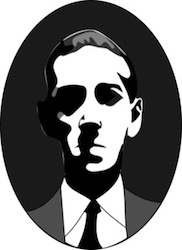
I suppose one could theorize that if he amended or revised his racist and xenophobic views over time, he might also have secretly revised or amended his views on the supernatural, but there is no concrete evidence to suggest this. Other than amused speculation, Lovecraft seems to have relegated the supernatural to weird fiction exclusively.
Lovecraft’s personal views have not stopped the aforementioned Dionysian-styled occult groups, particularly those who practice various types of Satanism and “black” magick, from attributing inspiration, if not wholesale modelling, of their spiritual beliefs to the pantheon of gods and systemic rituals described by Lovecraft. This may be due, in part, to both Lovecraft’s and the various groups’ idea of these gods as neither good nor evil, but rather opportunistic and largely indifferent to mankind unless a situation dictated an interest in them. It is only in the subsequent works by members of the Lovecraft circle that any true idea of the gods and elder things being divided between good and evil comes into play. Lovecraft’s pantheon is more in keeping with ancient pagan deities, who could be at times benevolent, and at others, destructive and brutal. There is the suggestion that some of the gods are more to be feared than others, and look to destroy mankind, rather than preserve it, but there is no particular malice even there; these gods simply find our destruction a means to an end, and it is no more a moral issue to them than ridding a roof eave of a hornet’s nest might be to us. While many modern “black” magick groups claim not to worship a deity at all, but rather acknowledge concepts under the names of deities, those who do often portray those deities in much the same way—cosmic, multiversal, and largely indifferent, except when bargains, sacrifices, and worship dictate otherwise.
Lovecraft’s most popular creation, the Necronomicon, a book detailing the origins and history of god-monsters known loosely as Great Old Ones and Elder Gods, as well as spells for summoning them, has been a subject of debate for decades. Was the Necronomicon based on some real, ancient tome, passed down through the ages, as many claim? Does it tap into a genuine theology practiced by people in millennia past? It is cited as a primary inspiration for several magickal systems for a number of reasons. Some groups believe that, while undoubtedly a fictitious creation, the book’s passages, as described by Lovecraft himself (and expounded upon by those in his circle), do provide a workable system of magick ritual and a pantheon of powerful entities to invoke and evoke for the ultimate “black” magick purpose of attaining knowledge. Supposedly, it has even been tested and allegedly found effective in actual occult ritual application.6 Some sources believe it was the other way around, that Lovecraft’s admiration of writers such as Arthur Machen, Algernon Blackwood, and others initiated into occult groups may have led him to hear about secret tomes that ultimately inspired the Necronomicon,1 although whether or not Lovecraft ever corresponded with any member of an occult group is still debated. His fictional gods, such as Cthulhu, Nyarlathotep, Shub-Niggurath, Azathoth, and Yog-Sothoth, do parallel some of the gods in the ancient Sumerian/Akkadian pantheon, both in name and purpose.8 Comparisons can be made to some of the Egyptian deities as well. Lovecraft’s interest in mythology has been documented in his letters to friends and colleagues. It is quite possible that he modelled his gods on ancient deities to make them plausible in his fiction, but scholars of the occult believe that “divine intervention” may have been his muse.
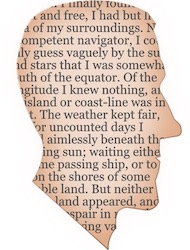
Some scholars and founders of occult groups in North America and Europe have suggested that Lovecraft’s Necronomicon and its rituals were dream messages from the gods it refers to. Interestingly, what came to Lovecraft in dreams was cited by the man himself to be a major source of inspiration.6 The experiences were so influential to him that he drew heavily from them for his work. He even paralleled the concept in his fiction; artistic types in “Call of Cthulhu”3 receive messages from the Great Old One himself, through dreams, and much of Lovecraft’s Dream Cycle stories revolve around access to dream realms. Dream Magick is a tradition that dates back to ancient times and diverse magickal systems, its basic principle being that messages are delivered from various otherworldly sources through the medium of dreams, and that a skilled and experienced practitioner can interpret the symbolism of dreams through intuition to predict the trajectory of future circumstances or understand current ones.
Lovecraft’s connection to dream magick reinforces, for many scholars, the notion that Lovecraft incorporated elements of true pagan magickal systems into the one he essentially developed for his fiction. It would suggest again that he did, indeed, understand more about actual practices and beliefs of various occult groups than he perhaps let on. The very diversity of his sources neither seems to prove nor disprove either side of the debate regarding Lovecraft’s involvement in the occult. One can find echoes of European magick that predates Wicca, ancient Egyptian and Sumerian mythology, Vodou, thelemic and hermetic systems, rituals from the Lesser Keys of Solomon, and colonial accounts of Salem, Massachusetts home-grown Satanism.
However, the same could be said of any number of current horror/weird fiction writers working today. Lovecraft’s occultism is most likely the result of a vibrant imagination and creative vision inspired by a number of sources. He has built an enduring, effectively terrifying, and consistently believable world of god-like monsters, multiple dimensions, and life in the universe far beyond the stars we know—in fact, far beyond any stars at all. His steadfast belief in the concrete world may have stemmed from subconscious fear of considering anything beyond it. He was a man of many contradictions of thought, a man who locked tightly onto certain modes of perception, while entertaining limitless vistas in others. He was both grounded and far beyond the lands of dreams and stars. Regardless of his personal involvement in the occult, his legacy is a contribution to the realm of possibility, a door through which dreamers and thinkers, philosophers and magick workers, and writers and artists of all types can explore concepts larger than ourselves. He has, in essence, contributed to the occult by leaving behind a mystery that is hidden from our view, and as scholars ourselves, we delight in exploring it.
Sources Cited:
(1) Harms, Daniel, and John Wisdom Gonce Necronomicon Files: The Truth Behind Lovecraft’s Legend, Red Wheel/Weiser, LLC, 2003
(2) Lovecraft, H.P. “The Horror at Red Hook,” Weird Tales, 1927
(3) Lovecraft, H.P. “Call of Cthulhu,” Weird Tales, 1928
(4) Lovecraft, H.P. “Dreams in the Witch House,” Weird Tales, 1933
(5) Lovecraft, H. P. “The Case of Charles Dexter Ward,” Weird Tales, 1941
(6) Steadman, John L. H.P. Lovecraft & the Black Magickal Tradition, Weiser Books, 2015
(7) Twyman, Tracy R. “Dead But Dreaming: The Great Old Ones...of Lovecraftian Legend Reinterpreted as Atlantean Kings,” https://www.bibliotecapleyades.net/cienciareal/cienciareal15.htm 2004


